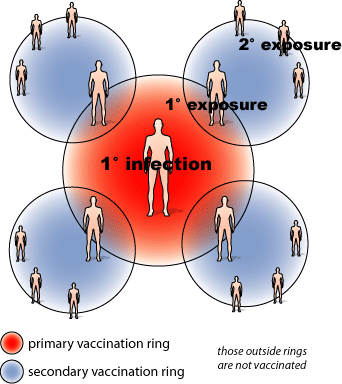Vaccination
What is vaccination?
Vaccination provides immunity to specific diseases.
This is achieved by exposing the immune system of the host to an antigenic material. The antigenic material starts an immune response to the antigen, but the pathogen that has been made harmless so it cannot cause a disease. Once the real, active pathogen invades, the host can have a fast secondary response.
What material can be used in vaccines?
- Whole live microorganisms.
- the antigens on the harmless organisms used in the vaccines are very similar to the antigens on the pathogenic organism. This means the antibodies produced will be effective against the antigen on the pathogen.
- eg cow pox in cows (harmless to humans) was used to elicit immunity in humans to small pox (a very dangerous pathogen to humans). It was one of the first vaccines to be used. Here is a re enactment.
- A harmless or attenuated (weakend) version of the pathogenic organisms. Measles and Tb use this form of vaccination.
- A dead pathogen eg typhoid and cholera vaccines.
- Isolated and prepared antigens from the pathogen eg hepititis B.
- Toxids harmless versions of toxins. eg tetanus vaccine.
How can vaccines be applied.
Herd immunity
This is when enough of the population is vaccinated to stop the pathogen from spreading. In order for small pox to be eradicated 85% of the population had to be vaccinated.
Herd immunity is used in the UK to decrease the spread of diphtheria, tetanus, whooping cough, polio, meningitis, measles, mumps and rubella.
Ring vaccination
 Scientists and doctors keep track of the antigens on these pathogens and try to prepare vaccine to new antigens ahead of an outbreak.
Scientists and doctors keep track of the antigens on these pathogens and try to prepare vaccine to new antigens ahead of an outbreak.
When a new case of a disease is reported, all people in the immediate vicinity are vaccinated, and then people who may have been in contact with these people.
How epidemics are controlled.
Once the disease has been eradicated, the vaccination programme can be cut back as the disease is unlikely to occur and spread again. Unfortunately some pathogens have DNA that mutates and causes the antigen to change. If the antigen is different to the one that the memory cells in a host recognise, the vaccine will no longer work and the incidence of the disease increases again.
Some pathogens mutate very quickly. if an antigen changes as a result of a mutation, the memory cells in the host do not recognise the antigen and unchallenged infection follows. Because no one in the population has immunity to the new antigen, the pathogen spreads very quickly and an epidemic occurs.
 Scientists and doctors keep track of the antigens on these pathogens and try to prepare vaccine to new antigens ahead of an outbreak.
Scientists and doctors keep track of the antigens on these pathogens and try to prepare vaccine to new antigens ahead of an outbreak. Different types of immunity.
Natural immunity: achieved by normal life processes.
Artificial immunity: achieved through medical intervention.
Active immunity: immune system is activated to make antibodies
Passive immunity: antibodies are made elsewhere (usually another organism) and given to the individual.






No comments:
Post a Comment